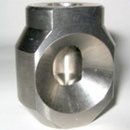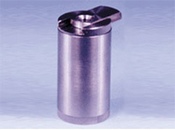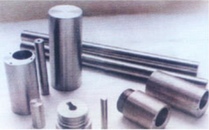Research radiation shielding



Nuclear research radiation shielding
Nuclear research establishments use nuclear reactors or cyclotrons to study or create radioactive materials. Tungsten alloy is used in research activities as collimators (devices which guide or focus beams of radiation) or containers for radioactive isotopes. Tungsten alloy is ideal for shielding against both X- and Gamma radiation. The very high density of tungsten shielding (more than 60% denser than lead) allows a reduction in the physical size of shielding components, without compromising the effectiveness of the shielding characteristics.
GEOLOGGING & NON DESTRCIVE TESTING (NDT)
Tungsten alloy is used as collimator or radiation shielding in the following applications:
Geologging
Geologging is an exploration technique used mainly in the oil and gas industries. It is also known as wireline logging and borehole logging. A gamma ray source is lowered into a borehole and the radiation penetrates the rock strata. This data can then be analysed to determine whether deposits of gas or oil are present. tungsten alloy is used to shield the radioactive source and to act as a collimator for the gamma beam.
Pipe-line inspection Gamma
Radiation is used to inspect welds and to detect cracks in pipelines. A gamma source is mounted on a remote-controlled wheeled trolley (sometimes called a "pig") and travels inside the length of the pipe. A WOLFMET tungsten collimator is used to direct the radiation onto the target, whilst the radioactive source is housed inside tungsten shielding.
Industrial radiography
Industrial radiography uses gamma radiation to detect structural faults in materials such as metal and concrete. As a pipe-line inspection, the equipment uses tungsten shielding, coupled with a tungsten collimator.
Thickness, density and level gauging radioactive sources are used in industrial processes to measure thickness, density or levels of materials during production e.g. paper, plastic film, steel sheet or surface coatings. The material passes between a radioactive source, which is housed in tungsten alloy, and a detector. The strength of the detector signal is used to measure the thickness, density or level of the material.
Homeland security and border control
The penetrating power of radiation has also been put to use in the fight against terrorism. The Homeland Security industry has designed scanners that use gamma radiation to detect objects in cargo containers or airline baggage.
The radioactive sources are very strong and require tungsten shielding to protect security staff and members of the public from the radiation. A tungsten collimator is also required to direct the gamma radiation onto its target.
Tungsten alloy data sheet
|
Type |
Density g/cm³ |
Tensile strength MPa |
Elongation |
HRC |
| 85W-10.5Ni-4.5Fe | 15.8-16.0 | 700-1000 | 20-33 | 20-30 |
| 90W-7Ni-3Fe | 16.9-17.1 | 700-1000 | 20-33 | 24-32 |
| 90W-6Ni-4Fe | 16.7-17.0 | 700-1000 | 20-33 | 24-32 |
| 91W-6Ni-3Fe | 17.1-17.3 | 700-1000 | 15-28 | 25-30 |
| 92W-5Ni-3Fe | 17.3-17.5 | 700-1000 | 18-28 | 25-30 |
| 92.5W-5Ni-2.5Fe | 17.4-17.6 | 700-1000 | 25-30 | 25-30 |
| 93W-4Ni-3Fe | 17.5-17.6 | 700-1000 | 15-25 | 26-30 |
| 93W-4.9Ni-2.1Fe | 17.5-17.6 | 700-1000 | 15-25 | 26-30 |
| 93W-5Ni-2Fe | 17.5-17.6 | 700-1000 | 15-25 | 26-30 |
| 95W-3Ni-2Fe | 17.9-18.1 | 700-900 | 8-15 | 25-35 |
| 95W-3.5Ni-1.5Fe | 17.9-18.1 | 700-900 | 8-15 | 25-35 |
| 96W-3Ni-1Fe | 18.2-18.3 | 600-800 | 6-10 | 30-35 |
| 97W-2Ni-1Fe | 18.4-18.5 | 600-800 | 8-14 | 30-35 |
| 98W-1Ni-1Fe | 18.4-18.6 | 500-800 | 5-10 | 30-35 |
| 90W-6Ni-4Cu | 17.0-17.2 | 600-800 | 4-8 | 25-35 |
| 93W-5Ni-2Cu | 17.5-17.6 | 500-600 | 3-5 | 25-35 |
Copyright©2001 - 2011 CTIA E-biz Center All Rights Reserved
